© 2014-


Radio Hauraki - History (6)
However, when Tiri reached the area it was too dark to locate the mooring buoy so the crew, DJs and technicians took it in turns to maintain a watch to ensure that she did not accidentally drift towards land. Unfortunately, at that point the Tiri's engines, which had performed so well all day, began to fail leaving the ship without a means of propulsion in addition to having no secure mooring for the night.
Without sufficient power to hold the vessel in position and with an increasing south west wind blowing there was a real danger that the Tiri would be driven onto rocks at Great Barrier Island. The crew did everything they could to prevent this happening, but despite their efforts the Tiri did begin to drift and at about 11.15pm she hit the rocks. DJ Paul Lineham interrupted a pre-
A minute or two later Paul Lineham returned to the studio and announced that despite everything he was going to try and present a programme. He started playing a record but 20 seconds of music later he announced that they were having to abandon ship. After playing a couple of Radio Hauraki jingles the station's transmitter went silent.
The Tiri’s crew and radio staff abandoned the vessel and swam ashore thro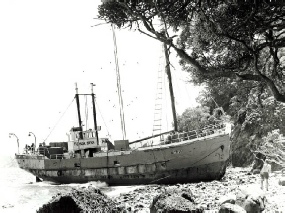 ugh the heavy seas, spending the night on a beach until daybreak revealed the full extent of the radio ship's plight.
ugh the heavy seas, spending the night on a beach until daybreak revealed the full extent of the radio ship's plight.
The Tiri had been pounded against the rocks all night and had over five feet of water in her hull covering much of the station's studio and transmitting equipment. After a brief examination of the vessel David Gapes decided that before towing the Tiri off the rocks all possible efforts should be made to salvage the vital transmitter and broadcasting equipment so that the station could return to the air as soon as possible from another vessel if necessary.
Insurance assessors later advised that once re-
On 29th January 1968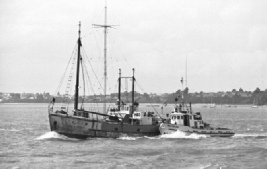 the tug Sea Toiler pulled Tiri from the rocks and, after temporary patches had been welded to her hull, she was towed to Auckland, but her role as a radio ship was already finished.
the tug Sea Toiler pulled Tiri from the rocks and, after temporary patches had been welded to her hull, she was towed to Auckland, but her role as a radio ship was already finished.
The directors and staff of Radio Hauraki had decided to continue operating the station and within days of the dramatic storm the station had received four offers of replacement ships. Quite quickly David Gapes and his team decided that the offer from their long-
Conversion work started almost immediately to turn the Kapuni, now renamed Tiri II into a radio ship. A 160' aerial mast was installed to provide improved reception for the station, the transmitter, which had been removed from the original Tiri, was steam cleaned and repaired before being installed on the Tiri II and a new, larger studio was also constructed on board. 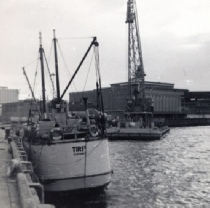
Within an incredible three weeks all work had been completed and at 1.15am on 27th February 1968 the Tiri II left Auckland for her anchorage in international waters. Test transmissions on low power began at 5.00pm that evening and regular programmes from Radio Hauraki started once again at 7.30am on 28th February 1968.
All did not go as smoothly as planned, however, and the station was frequently off the air during March 1968 with transmitter problems. On 27th March 1968 the Tiri II broke from her mooring buoy and began to drift in a storm. As a safety precaution Radio Hauraki's transmissions were halted and the Tiri II made for Whangaparapara Harbour.
Repairs were hurriedly carried out and the station was able to return to the air on 31st March 1968, but relief was short-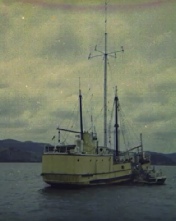 n 3rd April the new mooring chain snapped during another storm. Captain Lloyd Griffiths again took the ship into Whangaparapara, but experienced considerable difficulty steering his vessel into the harbour entrance.
n 3rd April the new mooring chain snapped during another storm. Captain Lloyd Griffiths again took the ship into Whangaparapara, but experienced considerable difficulty steering his vessel into the harbour entrance.
On 7th April 1968, with storm damage repairs completed the Tiri II left once again for her anchorage, but began broadcasting only half an hour after leaving port. The Radio Hauraki staff decided that the station had already lost enough advertising revenue during the last few weeks and were determined to get back to business as quickly as they could, even if that meant broadcasting from well inside territorial waters.

Tiri running aground, 28th January 1968

Click on picture to enlarge

Tiri stranded on the rocks
Photo: Auckland Star
Tiri returns to Auckland
Tiri II at Jellicoe Wharf before the aerial mast was installed

History
Key Dates
Ships and Location
Technical
Staff
Programmes









Treasure Chest

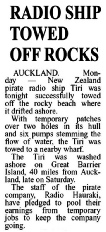
Sydney Morning Herald
30th January 1968
Tiri II at her anchorage in the Hauraki Gulf

Back to Radio Hauraki

Back to New Zealand Gallery



